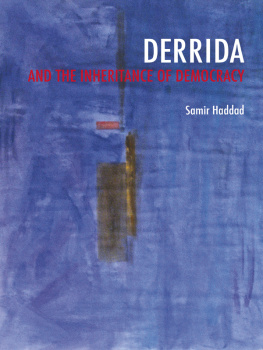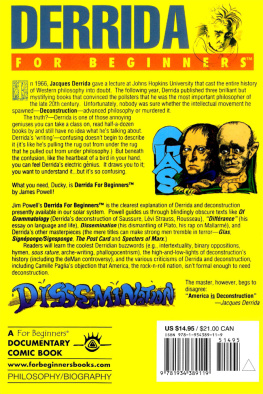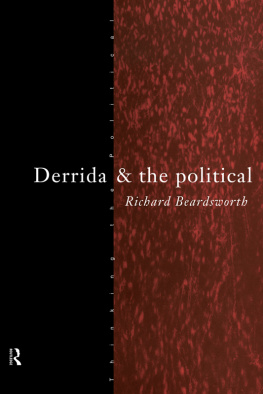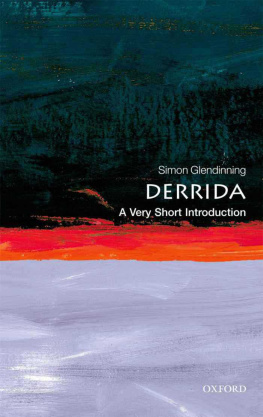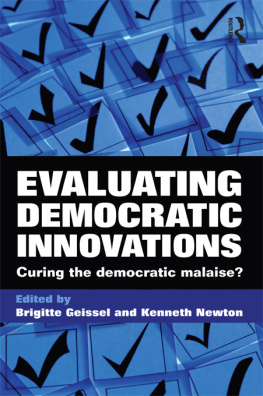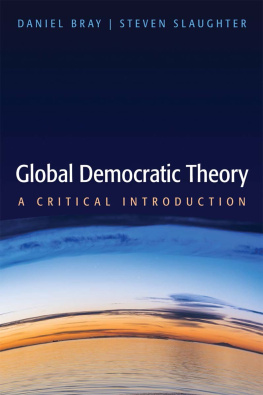The following abbreviations have been used in the text for frequently cited works by Jacques derrida.
A/AP | Aporias: DyingAwaiting (One Another at) the Limits of Truth. Translated by Thomas Dutoit. Stanford: Stanford University Press, 1993. Published in French as Apories (Paris: Galile, 1996). |
AV | Avances. Preface to Le tombeau de dieu artisansur Platon, by Serge Margel, 943. Paris: Minuit, 1995. |
FK/FS | Faith and Knowledge: The Two Souces of Religion at the Limits of Reason Alone. Translated by Samuel Weber. In Acts of Religion, edited by Gil Anidjar, 42101. New York: Routledge, 2002. Originally published as Foi et savoir, in Foi et savoir, suivi de Le sicle et le pardon (Paris: Le Seuil, 2000), 9100. |
FOL/FDL | Force of Law: The Mystical Foundation of Authority. Translated by Mary Quaintance. In Acts of Religion, edited by Gil Anidjar, 23098. New York: Routledge, 2002. Originally published as Force de loi (Paris: Galile, 1994). |
FW/DQ | For What TomorrowA Dialogue. Coauthored with Elisabeth Roudinesco. Translated by Jeff Fort. Stanford: Stanford University Press, 2004. Originally published as De quoi demainDialogue (Paris: Fayard/Galile, 2001). |
NW/LV | The Night Watch (over the book of himself). Translated by Pascale-Anne Brault and Michael Naas. In Derrida and Joyce: Texts and Contexts, edited by Andrew J. Mitchell and Sam Slote, 87108. Albany: State University of New York Press, 2013. Originally published as La veilleuse ( .. au livre de lui-mme). Preface to James Joyce ou l'criture matricide, by Jacques Trilling (Belfort: Circ, 2001), 732. |
OH/DH | Of Hospitality. Coauthored with Anne Dufourmantelle. Translated by Rachel Bowlby. Stanford: Stanford University Press, 2000. Originally published as De l'hospitalit (Paris: Calmann-Levy, 1997). |
PF/PA | Politics of Friendship. Translated by George Collins. London: Verso, 1997. Originally published as Politiques de l'amiti (Paris: Galile, 1994). |
R/V | Rogues: Two Essays on Reason. Translated by Pascale-Anne Brault and Michael Naas. Stanford: Stanford University Press, 2005. Originally published as Voyous: Deux essais sur la raison (Paris: Galile, 2003). |
SOM/SDM | Specters of Marx: The State of the Debt, the Work of Mourning, and the New International. Translated by Peggy Kamuf. New York: Routledge, 1994. Originally published as Spectres de Marx: L'tat de la dette, le travail du deuil et la Nouvelle Internationale (Paris: Galile, 1993). |
Throughout the text all references to works by Derrida that are available in both English and French refer first to the English pagination, then to the French. Unless stated otherwise, translations of works that are available only in French are mine.
Acknowledgments
T HIS BOOK WAS written over a number of years, and I have many people to thank for the inspiration, conversations, and help that were essential to its production.
First, thanks to David Michael Kleinberg-Levin, who, from the very beginning, provided excellent guidance and support, giving extensive feedback on everything he read. I owe an enormous amount to Penelope Deutscher, an inspiring philosopher whose influence on me is hard to measure. I'm very lucky to have first encountered European philosophy in Penny's lecture hall, and to have received her help ever since, not in the least across the whole process of the writing of this book. I am also grateful to Bonnie Honig and Sam Weber for their expertise and advice during the project's early stages. Their input was key in shaping the core argument.
I am privileged to have had Martin Hgglund as a friend and interlocutor over the past decade. I thank him for countless hours of conversation and argument, as well as for his feedback on the manuscript as a whole. Geoffrey Bennington and Johanna Oksala also read a draft of the manuscript, and their suggestions for improvement were invaluable. I thank Michael Naas for his generosity and insight the many times we talkedhis clarity and knowledge never failed to illuminate the more difficult ideas that I sought to understand. And thanks also to Ann Murphy and Jeffrey Flynn, exemplary colleagues and friends with whom I've discussed so much that is in these pages.
I've benefited from a strong community of scholars who helped me work through the ideas in this book at various stages in discussion and correspondence. Thanks to Joshua Andresen, Pleshette DeArmitt, Matthias Fritsch, Allan Hazlett, Leonard Lawlor, Paul Patton, Gayle Salamon, Alan Schrift, Daniel Smith, Jill Stauffer, Nicholas Tampio, and Patrick Weil for their time and input.
At Fordham University I owe much to two of my senior colleagues, John Drummond and Merold Westphal, for their support in the early stages of my career. I also received valuable financial support from Fordham in the form of a Faculty Research Grant in 2009, a Summer Faculty Research Grant in 2011, and a Faculty Fellowship in 2011, which aided in the writing of this book.
At Indiana University Press, Dee Mortensen, Sarah Jacobi, and Tim Roberts were an excellent editorial team, providing expert knowledge and advice that went a long way to improving the book. I also thank Paolo Pecchi for the permission to use his wonderful painting for the cover.
Finally, I thank my parents for all they have done to support me across a lifetime of learning. And thank you to Luisa, my light, for everything.
Earlier versions of some of the arguments in this book appeared in the following publications: Derrida and Democracy at Risk, Contretemps 4 (2004): 2944; Inheriting Democracy to Come, Theory & Event 8, no. 1 (2005); Reading Derrida Reading Derrida: Deconstruction as Self-Inheritance, International Journal of Philosophical Studies, 14, no. 4 (2006): 50520; A Genealogy of Violence, from Light to the Autoimmune, Diacritics 38, no. 12 (2008): 12142; Language Remains, CR: The New Centennial Review 9, no. 1 (2009): 12746; Jacques derrida, in History of Continental Philosophy, vol. 6: Poststructuralism and Critical Theory's Second Generation, edited by Alan D. Schrift (Chicago: University of Chicago Press, 2010), 11132; and Citizenship and the Ambivalence of Birth, Derrida Today 4, no. 2 (2011): 17393. In all cases the arguments have been modified.
SAMIR HADDAD is Assistant Professor of Philosophy at Fordham University.
1
The Structure of Aporia
Aporias
Despite the many different topics on which he writes, and the large diversity of authors he reads, Derrida's texts return the reader with insistence to what seems to be the same logical structure. This structure goes by various names, including undecidable, double bind, double constraint, aporia, contradictory injunction, antinomy, and process of autoimmunity. In each case, at stake is a relation between two elements that contradict each other at the same time that they depend on each other. It is thus a necessary contradiction, which cannot be resolved by traditional means such as denying one of the elements or lifting the relation up in a dialectical movement. The power of Derrida's analyses lies in his demonstration of the ways traditional modes of thinking lead to such irresolvable contradictions, and it is impressive that he is able to show this so consistently across readings of so many different authors, texts, subjects, and traditions.

